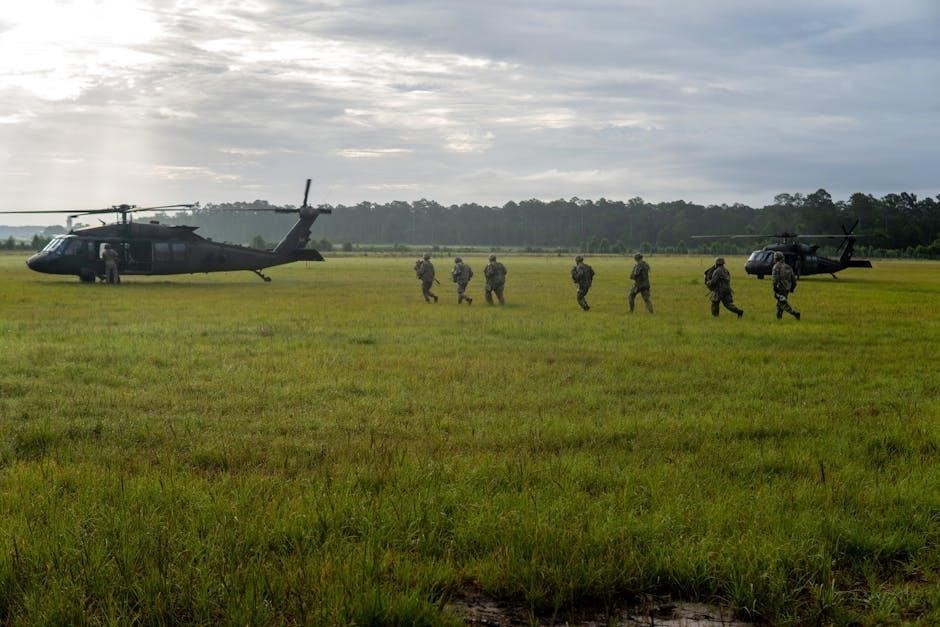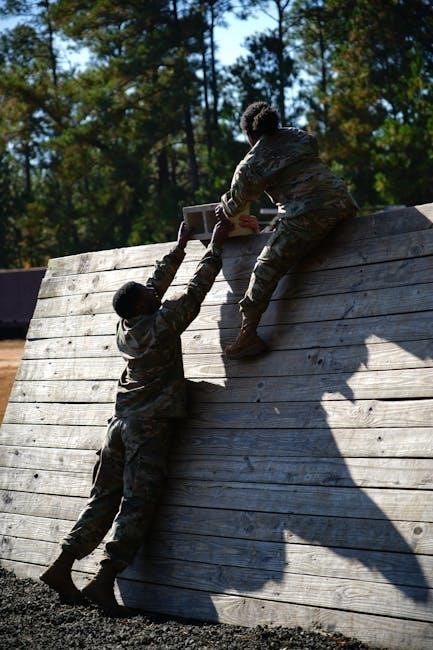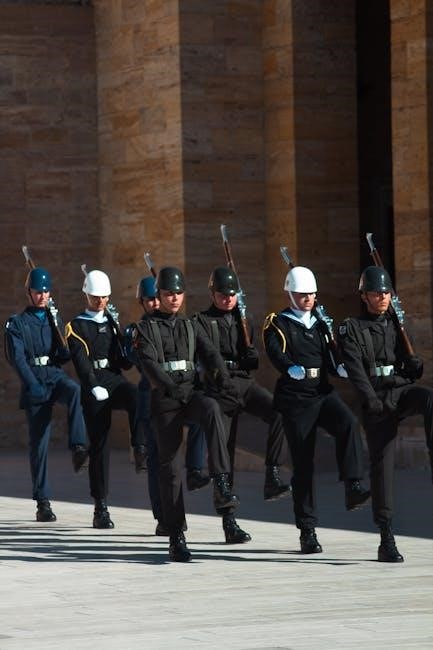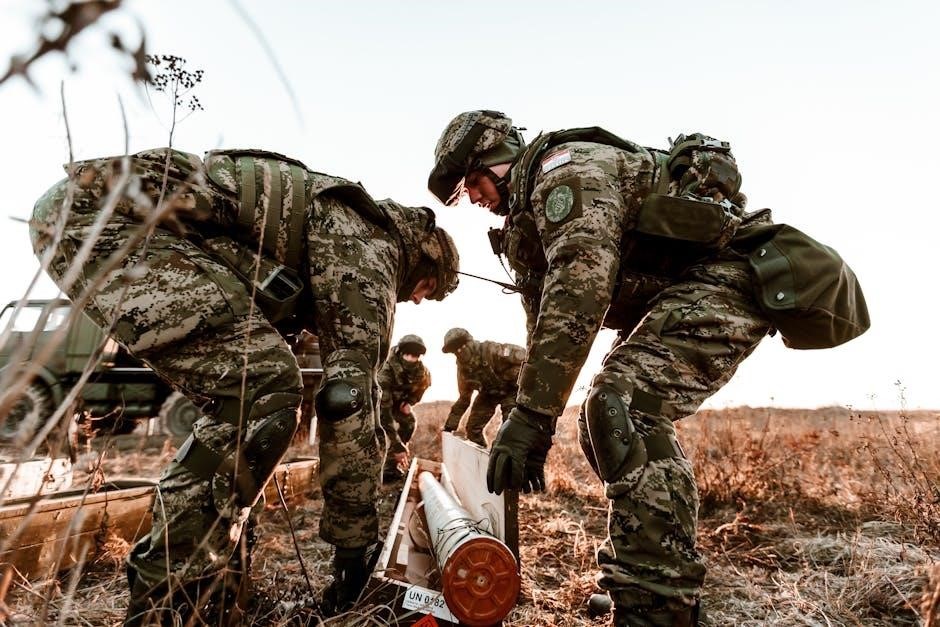This Is My Squad (TIMS) is an initiative by Sergeant Major Michael A. Grinston‚ focusing on fostering a culture of care and ownership within Army units.
It empowers squad leaders to enhance unit readiness and reduce negative incidents through leadership and accountability.
1.1 Overview of the Initiative
This Is My Squad (TIMS) is a leadership initiative launched by Sergeant Major Michael A. Grinston in 2019. It focuses on building cohesive‚ disciplined‚ and positive units by empowering squad leaders. The initiative aims to reduce negative incidents like harassment‚ assault‚ and suicide while fostering a culture of care‚ accountability‚ and ownership. It emphasizes leadership philosophy‚ communication‚ and unit-level practices to enhance readiness and efficiency across the Army.
1.2 Purpose and Objectives
The primary purpose of This Is My Squad (TIMS) is to empower first-line leaders to build cohesive‚ disciplined‚ and positive teams. Its objectives include fostering unit pride‚ reducing harmful behaviors‚ and enhancing readiness. By promoting accountability and ownership‚ TIMS aims to create a culture where Soldiers feel valued‚ supported‚ and committed to their mission and each other‚ ultimately strengthening the Army’s overall effectiveness and resilience.

Background and History of TIMS
Launched by Sergeant Major Michael A. Grinston in 2019‚ TIMS emphasizes unit pride and people-focused leadership‚ aligning with the Army’s top priorities to strengthen readiness and cohesion.
2.1 Launch by Sergeant Major Michael A. Grinston
Sergeant Major Michael A. Grinston introduced This Is My Squad (TIMS) in August 2019‚ shortly after becoming the Sergeant Major of the Army. This initiative aimed to strengthen unit cohesion and address issues like suicide and sexual harassment by empowering squad leaders. It aligns with the Army’s priority to focus on its people and enhance readiness through leadership and accountability.
2.2 Evolution Since 2019
Since its 2019 launch‚ This Is My Squad has evolved into a comprehensive initiative‚ expanding its focus on leadership development and unit culture. It introduced training resources‚ such as Squad Leader Development Courses‚ to empower leaders. The program also emphasized reducing negative incidents like harassment and suicide‚ fostering a culture of care and accountability. Its impact has grown‚ becoming a cornerstone of Army leadership philosophy.

Core Values and Principles
TIMS emphasizes empowerment‚ accountability‚ and cohesion‚ fostering a culture of care and ownership within units‚ ensuring leaders prioritize their squad’s well-being and mission success collectively.
3.1 Empowerment of First-Line Leaders
Empowerment of first-line leaders is a cornerstone of TIMS‚ enabling squad leaders to implement best practices and foster a positive environment. By granting autonomy‚ leaders can address unit-specific challenges‚ improving readiness and efficiency. This approach ensures leaders are equipped with the tools and resources‚ such as manuals and training‚ to cultivate a culture of care and accountability within their squads.
3.2 Accountability and Ownership
Accountability and ownership are central to TIMS‚ emphasizing leaders’ responsibility for their squads’ actions and outcomes. By fostering a culture of accountability‚ TIMS aims to reduce incidents like harassment and assault‚ promoting a disciplined and positive environment. This approach ensures leaders take pride in their squads’ successes and address challenges promptly‚ enhancing overall unit efficiency and readiness.
3.3 Cohesion and Esprit de Corps
Cohesion and esprit de corps are vital to TIMS‚ fostering unity and pride among squad members. By strengthening interpersonal connections and shared identity‚ TIMS enhances teamwork and trust‚ reducing divisive behaviors. This collective spirit ensures squads operate as disciplined‚ positive‚ and ready teams‚ ultimately improving mission success and overall unit performance.

Implementation Strategies
TIMS implementation strategies focus on leadership philosophy‚ effective communication‚ and unit-level practices to foster a culture of care and accountability.
4.1 Leadership Philosophy and Communication
TIMS emphasizes a leadership philosophy centered on empowerment‚ trust‚ and transparency. Squad leaders are encouraged to communicate effectively‚ fostering open dialogue and mutual respect. By understanding their Soldiers’ strengths‚ leaders can craft personalized approaches to mentorship and decision-making‚ ensuring alignment with unit goals and fostering a cohesive team environment. This philosophy drives accountability and shared responsibility across all levels.
4.2 Unit-Level Initiatives and Practices
Unit-level initiatives under TIMS focus on fostering cohesion and pride through structured practices. Squad leaders implement mentorship programs‚ team-building exercises‚ and targeted training to enhance readiness. These practices emphasize accountability‚ reducing incidents like harassment and assault. By fostering a positive environment‚ units achieve higher levels of discipline and efficiency‚ aligning with the Army’s broader goals of leadership development and mission success.

Impact and Outcomes
TIMS has led to a reduction in negative incidents‚ such as harassment and assault‚ while improving unit readiness and efficiency.
It fosters a culture of care and accountability‚ enhancing overall mission success.
5.1 Reduction in Negative Incidents
The implementation of TIMS has significantly reduced negative incidents such as sexual harassment‚ assault‚ and suicide within Army units.
By fostering a culture of care and accountability‚ squad leaders have been able to identify and address issues early‚ creating a safer and more supportive environment for soldiers. This proactive approach has also led to a decrease in racism‚ domestic violence‚ and other harmful behaviors‚ improving overall unit cohesion and readiness.
5.2 Enhanced Unit Readiness and Efficiency
The TIMS initiative has significantly improved unit readiness and efficiency by fostering a culture of care‚ pride‚ and ownership among soldiers.
Empowered squad leaders ensure disciplined‚ positive‚ and ready teams‚ leading to enhanced mission accomplishment. The focus on leadership and accountability has streamlined operations‚ contributing to the Army’s overall effectiveness and preparedness for challenges. This approach has strengthened unit cohesion and operational capabilities.
Challenges and Criticisms
Despite its goals‚ TIMS faces challenges like inconsistent execution and varying leader buy-in‚ with some questioning its impact on reducing behavioral issues effectively.
Implementation hurdles remain a concern.
6.1 Implementation Hurdles
Effective implementation of TIMS requires consistent leadership engagement and cultural shifts‚ yet varying levels of commitment across units often hinder progress. Additionally‚ balancing the initiative with existing training demands poses challenges‚ while ensuring all leaders are adequately trained and resourced remains a significant obstacle in achieving widespread adoption and sustained success.
6.2 Critique and Controversies
Despite its positive intent‚ TIMS has faced criticism regarding its reliance on individual leader commitment‚ which can vary widely across units. Some argue the initiative lacks concrete metrics for success‚ making its effectiveness difficult to measure. Additionally‚ skepticism exists about whether TIMS addresses deeper systemic issues or merely adds another layer of training requirements without significant cultural change.
The Role of Leadership in TIMS
Leadership is central to TIMS‚ empowering squad leaders to take ownership and foster a positive‚ cohesive environment. Leaders guide squad leaders in developing a personal leadership philosophy.
7.1 Empowering Squad Leaders
This Is My Squad empowers squad leaders to take ownership of their teams‚ fostering a culture of accountability and cohesion. Through leadership development courses and resources‚ squad leaders gain the tools to mentor and inspire their soldiers‚ creating a positive and disciplined environment. TIMS emphasizes trust‚ communication‚ and shared responsibility‚ enabling leaders to address challenges effectively and enhance unit readiness. Squad leaders are encouraged to adapt Army best practices to their unique contexts‚ ensuring a tailored approach to leadership and team-building.
7.2 Leadership Philosophy Development
TIMS emphasizes the development of a personal leadership philosophy‚ fostering trust‚ commitment‚ and a focus on developing others. Squad leaders are encouraged to define their approach‚ ensuring alignment with Army values and the initiative’s goals. Through SLDC facilitation‚ leaders craft philosophies that prioritize their soldiers’ growth and unit cohesion‚ creating a foundation for effective leadership and mission success.
Training and Resources
TIMS provides Squad Leader Development Courses (SLDC) and accessible manuals‚ guiding leaders to build cohesive teams and foster positive environments‚ enhancing mission success and soldier growth;
8.1 Squad Leader Development Courses
Squad Leader Development Courses (SLDC) are designed to equip leaders with essential skills to foster cohesive teams. These courses focus on crafting personal leadership philosophies‚ emphasizing commitment‚ trust‚ and development. By integrating Army doctrine and real-world insights‚ SLDC empowers leaders to address challenges like harassment and suicide while building positive‚ mission-ready squads‚ ensuring a culture of care and accountability within units.
8.2 Access to TIMS Manuals and Guides
TIMS manuals and guides provide leaders with actionable strategies to build cohesive teams. These resources‚ available as free PDF downloads‚ include methods for fostering unit culture and addressing social issues. The “Building Cohesive Teams” handbook‚ for example‚ offers practical tools to measure performance and improve squad dynamics‚ aligning with Army values and the TIMS initiative’s goals of empowerment and accountability.
Cultural Shifts in the Army
TIMS promotes a culture of care‚ accountability‚ and cohesion‚ addressing issues like harassment and suicide. It fosters belonging and unity‚ transforming the Army’s leadership environment.
9.1 Fostering a Culture of Care
TIMS emphasizes creating an environment where Soldiers feel valued and supported‚ reducing incidents of harassment and suicide. By empowering leaders to prioritize their teams’ well-being‚ the initiative promotes unity and trust‚ fostering a culture where care and accountability thrive‚ enhancing overall unit cohesion and mission readiness.
9.2 Addressing Social Issues
TIMS tackles social challenges like racism‚ sexual harassment‚ and domestic violence by promoting inclusivity and respect within units. Leaders are encouraged to address these issues openly‚ fostering a culture of dignity and equality. This proactive approach aims to eliminate harmful behaviors‚ ensuring a positive and supportive environment for all Soldiers‚ which strengthens unit cohesion and readiness.
Comparison with Other Army Initiatives
TIMS aligns with broader Army efforts to enhance unit culture‚ similar to other leadership and readiness programs‚ focusing on empowerment and cohesion at the squad level.
10.1 Similar Programs and Their Impact
Similar Army initiatives‚ like the NCO Strategy and Soldier 2020‚ focus on leadership and readiness. These programs share TIMS’ goals of fostering unit cohesion and reducing negative incidents. They emphasize empowerment and accountability‚ creating a culture of care and responsibility. Together‚ they contribute to a holistic approach to improving Army effectiveness and Soldier well-being across all levels.
Future of TIMS
TIMS will continue to evolve‚ focusing on sustaining momentum through ongoing training and resource development. Its future includes expanding leader development programs and integrating new strategies to enhance unit effectiveness and Soldier well-being.
11.1 Sustaining Momentum
TIMS will sustain momentum by continuously refining leadership development programs and integrating feedback from unit leaders. This includes expanding access to Squad Leader Development Courses and updating TIMS manuals to reflect evolving challenges. By fostering a culture of care and accountability‚ the initiative aims to ensure long-term success and adapt to future Army needs effectively.
11.2 Continuous Improvement
TIMS emphasizes continuous improvement through ongoing assessments and adaptations. By monitoring unit outcomes and incorporating feedback‚ the initiative refines its strategies to address emerging challenges. Regular updates to training materials and leadership practices ensure relevance and effectiveness‚ fostering a culture of growth and excellence within Army units.
TIMS has proven effective in fostering unit cohesion and reducing negative incidents. Its focus on empowerment and accountability ensures a brighter future for Army leadership and readiness.
12.1 Summary of Key Points
This Is My Squad (TIMS) emphasizes empowering leaders‚ fostering accountability‚ and building cohesive units. It promotes a culture of care‚ reduces harmful behaviors‚ and enhances readiness. By focusing on squad-level ownership‚ TIMS aligns with the Army’s people-first priorities‚ ensuring leaders are equipped to create positive‚ disciplined‚ and high-performing teams. Resources like manuals and guides further support its mission to strengthen leadership and unit pride across the Army.
12.2 Final Thoughts on Effectiveness
TIMS has proven impactful in fostering a culture of care‚ accountability‚ and ownership within Army units. By empowering leaders and prioritizing squad cohesion‚ it has contributed to reduced negative incidents and enhanced readiness. Its success‚ however‚ depends on consistent leadership commitment and adaptability. Overall‚ TIMS remains a vital initiative in strengthening the Army’s foundation and ensuring mission success through empowered‚ disciplined‚ and caring teams.
